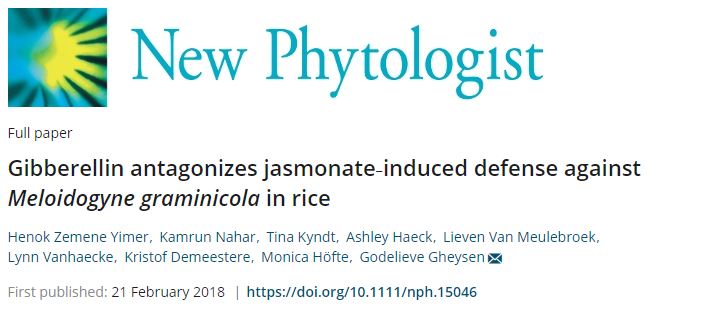방문교수 Godelieve Gheysen 강연: 선충 침의 식물면역 억제능력
지난 4월26일, 겐트대학교 방문교수 Godelieve Gheysen는 “선충 침의 식물면역 억제능력”이란 제목으로 강연을 진행하였다. 벼(Oryza sativa L.)는 아주 중요한 식품이기도 하지만 외떡잎 식물을 대표하는 모델 유기체인데, 근래 민물 결핍으로 인한 유산소 재배 방법으로 뿌리혹 선충(Meloidogyne graminicola)의 감염과 확산 가능성이 높아지고 있다. 뿌리혹 선충이란 식물 병원체는 정주성 삶을 살아가기 때문에 뿌리에서 오래 살아가기 위한 복잡한 감염 전략을 지니고 있는데, 특히 식물 내에 선충효과기 (Nematode effectors)를 분비하여 성공적인 기생을 하도록 돕는다. Gheysen 연구팀은 주로 선충효과기의 식물면역 억제매커니즘과 식물 호르몬전달에 대한 저해작용을 연구하고 있고 선충을 저항하는 벼를 상업화하기 위한 연구를 진행하고 있다. 실험결과로 선충효과기가 식물의 PTI (PAMP triggered immunity)를 억제한다는 것이 밝혀졌고, 한편으로는 뿌리혹 선충의 기생능력을 억제하는 벼 종류도 찾아냈다.
Rice (Oryza sativa L.) is not only a staple food but also a good model organism for monocot plants. Scarcity of fresh water is causing a shift to aerobic rice cultivation which benefits the distribution and infection of Meloidogyne graminicola, the most damaging root-knot nematode of rice [Kyndt et al., 2014, Annual Review of Phytopathology 52: 135-153). M. graminicola is a biotrophic pathogen with a sedentary life style and therefore it developed complex strategies to invade and survive in the roots for a long period. Nematode effectors secreted in the plant by the nematode are essential for successful parasitism. In our research, we are analyzing how nematode effectors suppress the plant defense response and interfere with plant hormone pathways [Yimer et al., 2018, New Phytologist 218: 646-660]. Assays triggering the early defense response of the plant demonstrate that effectors can suppress PTI (PAMP triggered immunity) [Naalden et al. 2018, Molecular Plant Pathology in press]. On the other hand, screening has identified rice varieties that are resistant to M. graminicola [Dimkpa et al., 2016, Journal of Experimental Botany: 67, 1191–1200] opening new research opportunities for the analysis of the rice-nematode interaction and opportunities to develop commercial varieties resistant to M. graminicola.
겐트대학교 생명과학부 생물공학과 교수 Godelieve Gheysen: godelieve.gheysen@ugent.be


